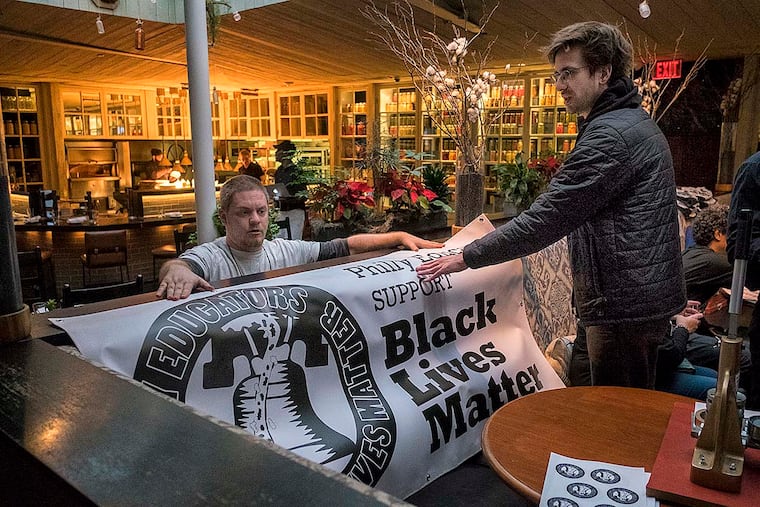Black Lives Matter week 'an affirmation' for students, Philly teachers say

Some teachers have worn shirts. Others have led discussions, assigned projects, or hosted lunchtime seminars.
On Saturday, Eagles safety Malcolm Jenkins will even chime in.
This week has been designated a time to focus on the Black Lives Matter movement by some Philadelphia School District teachers who had hoped -- by offering sample lessons -- to spur awareness of a cause they feel is imperative in a school system where most students are black or Latino, despite the controversy around the subject.
The effort was not sponsored or sanctioned by the school system or the Philadelphia Federation of Teachers, and organizers -- members of the Caucus of Working Educators, a group within the teachers' union -- do not know exactly how many teachers or schools participated.
Counting district schools, charters, a home-school organization, and colleges that have signed on, about 100 schools said they participated in some way, an organizer estimated. But that's a small percentage of the number of schools in the area.
The school system did not allow reporters to sit in on Black Lives Matter lessons. But teachers who presented them said they were generally well-received.
In one of Kate Reber's English classes at Bodine High, a magnet school in Northern Liberties, a Black Lives Matter lesson was a natural fit, she said.
Students were already reading The Fire Next Time, a James Baldwin book that deals with issues of race. She directed them to choose a theme from Black Lives Matter's 13 principles -- from "unapologetically black" to "loving engagement" -- to find quotations from the book that explore the theme, and create a collage about it.
Students' opinions on the movement are varied, Reber said, and that's just fine. If the teenagers didn't want to use one of the Black Lives Matter themes, they could choose their own.
"I did want to make sure that no one was silenced by the assignment," said Reber.
Bodine is a diverse school, and while "some students are very familiar with Black Lives Matter, other students are familiar with it in a way that they want nothing to do with it," she said.
Reber said she knew of no other Bodine teacher who had planned a Black Lives Matter-specific lesson, but said that others at the school were "comfortable wearing a button or a T-shirt" broadcasting their solidarity with the movement.
At Feltonville School of Arts and Sciences, Shira Cohen managed to incorporate a lesson into her seventh-grade math class. Students studied percentage change and percentage error, and instead of problems that might reference the number of sandwiches in a lunch order -- "which is not relevant in a deep way" to her students, she said -- they are evaluating the percentage of students of color who are suspended from classes.
"I want to find numbers that relate back to the Black Lives Matter movement," Cohen said.
Teacher participation ranges at Feltonville, Cohen said -- some have mentioned Black Lives Matter once and are moving on, and others are incorporating it into their lessons all week.
Shaw MacQueen, a teacher at Mitchell Elementary, a K-8 school in Southwest Philadelphia, said that Black Lives Matter has come up a few times in his eighth-grade English and social studies classes this year, mostly in the context of current-events lessons.
"The students see whether we mention it or not," said MacQueen. "They watch things, they see it online, they experience it themselves."
When he brought it into the classroom this week in a deliberate way, students had questions.
"Some of them wanted to know how it was funded," MacQueen said. "It was nice to see them not just blindly accepting things. That's what the district wants us to do: to produce critical thinkers."
Charlie McGeehan, one of the Black Lives Matter week organizers and a teacher at the U School in North Philadelphia, was cheered by students' reactions.
One student raised a question: Why Black Lives Matter, not All Lives Matter? It wasn't a typical response, but it was a fruitful conversation, he said.
"Saying Black Lives Matter, for most of our students, is not a controversial statement," McGeehan said. "It's an affirmation."
Jenkins, the Eagles safety who has made clear his support for the movement in the past, will participate in a closing panel discussion at Temple University on Saturday hosted by the Caucus of Working Educators.
To effect change, you first have to understand how a system works, Jenkins said in a statement.
"That's why I am on the journey that I am on now, learning the inner workings of systems that have been set up to disadvantage minorities, especially black people. That's why I am vigilant in my efforts to support and empower people of color," Jenkins said.
Not all are happy with the group's decision to introduce Black Lives Matter curriculum into some city schools, though, labeling the movement antipolice, among other things.
John McNesby, president of Fraternal Order of Police Lodge 5 in Philadelphia, said he did not agree with the concept.
"We think there's a lot better subjects that could be taught," McNesby has said.
And Christopher Paslay, a teacher at Swenson Arts and Technology High School, thinks that Black Lives Matter has no place in schools.
"It challenges nuclear families and our justice system," Paslay said.